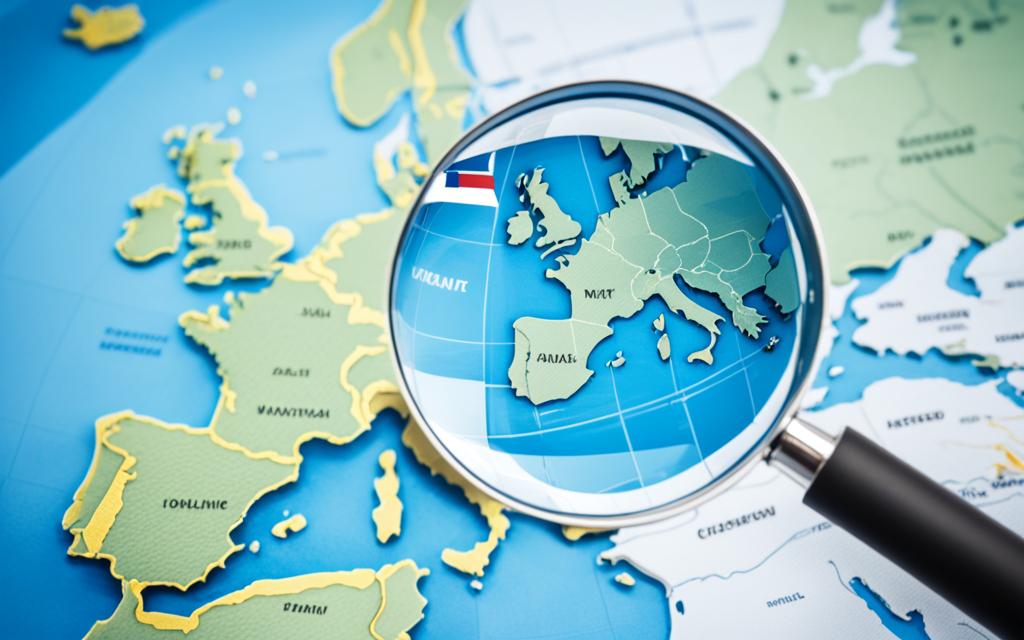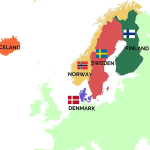Welcome to our comprehensive guide on how to expand your business to The Nordic Countries. If you’re looking to unlock new markets and explore opportunities for growth, you’ve come to the right place. The Nordic Countries offer a wealth of business prospects, and by expanding your operations to this region, you can tap into its economic stability and take advantage of the numerous business opportunities available.
In this guide, we will walk you through the essential steps and strategies needed to successfully expand your business to The Nordic Countries. From understanding the market dynamics and cultural differences to setting up a company and developing a local network, we’ve got you covered.
Expanding your business to The Nordic Countries requires careful planning and execution. Marketing and promoting your business in this region is crucial, and we will delve into various effective strategies that will help you reach your target audience.
Additionally, we will address the challenges that you may encounter and provide insights on how to overcome them, ensuring your business expansion is a success.
So, whether you’re an established company or a budding entrepreneur, this comprehensive guide will equip you with the knowledge and tools to navigate the complexities of expanding your business to The Nordic Countries.
Why Expand to The Nordic Countries?
Expanding your business to The Nordic Countries can offer a range of lucrative opportunities and economic stability. With a thriving business landscape and a reputation for innovation, this region provides a fertile ground for growth and success.
One of the key reasons to consider expanding to The Nordic Countries is the abundance of business opportunities available. From well-established industries like technology and manufacturing to emerging sectors such as renewable energy and sustainable agriculture, there is a diverse range of sectors to explore.
Moreover, The Nordic Countries boast a robust and stable economy, making it an attractive destination for international businesses. These nations have implemented sound economic policies that have resulted in steady growth and resilience, even during times of global economic uncertainty.
By expanding your business to The Nordic Countries, you can tap into a highly skilled workforce, renowned for their expertise in various industries. The region’s well-developed infrastructure, favorable business environment, and strong support network for entrepreneurs further enhance the ease of doing business.
In addition, The Nordic Countries have a solid framework for intellectual property rights protection, providing a secure environment for companies to invest in research and development. This, coupled with a strong commitment to sustainability and innovation, creates an ideal ecosystem for businesses looking to drive growth and make a positive impact.
Whether you are a small start-up or a multinational corporation, expanding to The Nordic Countries can open doors to new markets, drive profits, and position your business for long-term success. In the following sections, we will delve into the specifics of understanding the market, setting up a company, developing a local network, and marketing your business in this dynamic region.
Understanding the Market in The Nordic Countries
Expanding your business to The Nordic Countries can offer tremendous growth opportunities. However, to succeed in this region, it is crucial to have a comprehensive understanding of the market dynamics, backed by thorough market research and an appreciation for the cultural differences that exist.
Conducting market research is essential when expanding to The Nordic Countries. It helps you gain valuable insights into consumer preferences, market trends, and competitive landscapes. By gathering data on consumer behavior, purchasing habits, and market size, you can tailor your business strategies to meet the specific needs of your target audience.
One aspect that cannot be overlooked when venturing into The Nordic Countries is the cultural differences that exist across the region. Each country within The Nordic Countries has its unique cultural nuances and business practices. By understanding and respecting these differences, you can establish strong relationships with local customers, partners, and stakeholders, leading to better business outcomes.
Key Factors to Consider:
- Economic Environment: The Nordic Countries are known for their stable and robust economies. Understanding the economic landscape, market regulations, and industry trends will help you make informed business decisions.
- Consumer Behavior: The preferences and behavior of consumers in The Nordic Countries may vary from your home market. Studying consumer preferences, purchasing power, and spending habits will enable you to develop products and marketing strategies that resonate with your target audience.
- Competitive Analysis: Identifying and analyzing your competitors in the region is crucial for gaining a competitive edge. Understanding their strengths, weaknesses, and market positioning can help you differentiate yourself and effectively target your prospective customers.
- Local Regulations: Each country within The Nordic Countries has its specific legal and regulatory requirements for doing business. Familiarize yourself with the local laws, licensing procedures, and tax obligations to ensure compliance and avoid any potential legal issues in the future.
Understanding the market and cultural dynamics in The Nordic Countries is vital to successfully expand your business. By conducting thorough market research, respecting cultural differences, and considering key factors such as the economic environment, consumer behavior, competitive analysis, and local regulations, you can position your business for growth and capitalize on the exciting opportunities this region has to offer.
Setting up a Company in The Nordic Countries
Expanding your business to the Nordic Countries can open up new opportunities and markets for growth. If you’re considering establishing your company in this region, it’s important to understand the legal requirements and business registration procedures involved. In this section, we’ll guide you through the process step-by-step to ensure a smooth and successful setup.
1. Research the Legal Requirements
Before diving into the company registration process, it is crucial to familiarize yourself with the legal requirements in the Nordic Countries. Each country may have its own regulations and criteria for establishing a business. Factors such as company structure, share capital, and licensing requirements differ, so thorough research is essential.
2. Choose the Right Business Structure
Selecting the appropriate business structure is vital when setting up a company. The Nordic Countries offer several options, including sole proprietorship, partnership, and limited liability company. Consider consulting with legal professionals or experts in the region to determine the most suitable structure for your business goals and operations.
3. Prepare the Necessary Documentation
Completing the necessary paperwork is a fundamental step in the business registration process. Ensure you have all the required documentation ready, such as identification documents, articles of association, shareholder agreements, and any other relevant forms. Don’t forget to have them translated if needed.
4. Register Your Business
Once you’ve gathered the required documents, it’s time to register your company in the Nordic Countries. This process typically involves submitting the necessary paperwork to the relevant authorities, such as the national business registry or companies’ house. Adhere to the specific registration guidelines and include all required information accurately.
5. Obtain Necessary Permits and Licenses
Depending on your business activities, you may need to obtain additional permits or licenses to operate legally in the Nordic Countries. Research the specific industry regulations and requirements and ensure you secure all necessary authorizations before commencing your operations.
6. Seek Professional Assistance
Setting up a company in a foreign country can be complex, especially when dealing with legal matters. Consider enlisting the help of professional advisors, such as lawyers or consultants, who specialize in business setup within the Nordic Countries. Their expertise can help streamline the process and ensure compliance with all legal requirements.
By following these steps and investing time in understanding the legal framework, you’ll be well on your way to successfully establishing your company in the Nordic Countries. Remember, compliance and proper registration are key to a solid foundation for your business.
Developing a Local Network and Partnerships
Expanding your business to The Nordic Countries requires more than just a solid product or service. Building a strong local network and forming partnerships is essential to your success. In this section, we will provide you with valuable tips on how to connect with local businesses, find potential partners, and establish mutually beneficial relationships.
When entering a new market, local knowledge and connections can make all the difference. By partnering with established businesses in the region, you can benefit from their expertise, market insights, and established customer base. It’s a win-win situation that can accelerate your growth and help you navigate the intricacies of doing business in The Nordic Countries.
Finding Local Businesses and Potential Partners
The first step to developing a local network is to identify and connect with relevant businesses in your industry. Here are some strategies to help you find potential partners:
- Attend industry events and trade shows: These events provide an excellent opportunity to meet and network with local businesses. Be prepared to introduce your company, discuss your goals, and explore potential collaboration.
- Join local business associations and chambers of commerce: These organizations often host networking events, seminars, and workshops that can help you make valuable connections and gain insights into the local business landscape.
- Utilize online platforms and directories: Online platforms, such as LinkedIn and industry-specific directories, can be a valuable resource for finding local businesses and potential partners. Network with professionals, join relevant groups, and reach out to potential partners directly.
Establishing Mutually Beneficial Relationships
Once you’ve identified potential partners, it’s important to approach them with a clear value proposition and a collaborative mindset. Here are some tips for establishing mutually beneficial relationships:
- Highlight your unique selling points: Clearly communicate the benefits of partnering with your business. Explain how your products or services can complement those of your potential partners and contribute to their growth.
- Offer incentives: Consider offering incentives, such as revenue-sharing models, co-marketing opportunities, or exclusive access to your technology or products. These incentives can strengthen your partnership and create a win-win situation.
- Invest in relationship building: Building strong relationships takes time and effort. Regularly communicate with your partners, participate in joint marketing initiatives, and collaborate on projects that showcase your shared capabilities.
By developing a robust local network and establishing strategic partnerships, you can leverage the knowledge, resources, and market presence of local businesses to accelerate your expansion into The Nordic Countries. The Nordic market offers exciting opportunities, and with the right connections, you can unlock its full potential.
Marketing and Promoting Your Business in The Nordic Countries
Expanding your business to The Nordic Countries presents immense opportunities for growth and success. However, to truly capitalize on these opportunities, effective marketing and promotion are crucial. In this section, we will discuss various marketing strategies, both online and offline promotional activities, and highlight the importance of adapting your messages to the local market.
1. Tailoring Your Marketing Strategies
When expanding to The Nordic Countries, it is essential to tailor your marketing strategies to resonate with the local audience. Conduct thorough market research to gain insights into consumer behavior, preferences, and cultural nuances. Use this information to craft targeted and compelling marketing messages that will engage your target customers in this region.
2. Online Marketing Channels
The Nordic Countries have a high internet penetration rate, making online marketing channels highly effective. Invest in search engine optimization (SEO) to improve your website’s visibility in search engine results. Leverage social media platforms like Facebook, Instagram, and LinkedIn to connect with your target audience and build brand awareness. Additionally, consider partnering with influential bloggers or content creators to increase your online presence and reach a wider audience.
3. Offline Promotional Activities
While online marketing is vital, don’t overlook the power of offline promotional activities. Participate in industry trade shows, conferences, and networking events to showcase your products or services and connect with potential customers and partners. Sponsor local events or community initiatives to enhance your brand’s visibility and demonstrate your commitment to the local market.
4. Collaborate with Local Influencers
Collaborating with local influencers can significantly boost your brand’s visibility and credibility in The Nordic Countries. Identify influential individuals within your industry who have a strong following and align with your brand values. Engage them in collaborations, such as sponsored content or co-branded campaigns, to tap into their network and leverage their influence to reach your target audience.
5. Localize Your Marketing Materials
Localization is key when marketing and promoting your business in The Nordic Countries. Translate your marketing materials, including website content, product descriptions, and advertising campaigns, into the local languages, such as Swedish, Norwegian, Danish, and Finnish. This demonstrates your commitment to the local market and helps to build trust with potential customers.
6. Measure and Adjust Your Strategies
Regularly monitor the performance of your marketing efforts and use data analytics to measure the effectiveness of your strategies. Analyze key metrics such as website traffic, conversion rates, and engagement levels to gain insights into what is working and what needs adjustment. Continuously optimize your marketing strategies based on these insights to maximize your results in The Nordic Countries.
Overcoming Challenges and Ensuring Success
Expanding your business to The Nordic Countries can be a rewarding endeavor, but it comes with its own unique set of challenges. Understanding and successfully navigating these challenges is crucial to ensure the success of your expansion.
One of the main challenges you may encounter is the cultural differences between The Nordic Countries and your home market. It is essential to research and understand the local customs, values, and business practices to effectively connect with the target audience and build strong relationships with local partners.
Another challenge is the competitive landscape. The Nordic Countries have a well-developed business environment with strong competition in various industries. To stand out and gain a competitive advantage, it is important to offer unique value propositions, tailor your products or services to local preferences, and continuously monitor and analyze the market to identify opportunities.
Successful expansion to The Nordic Countries relies on several key factors. First and foremost, building a talented and diverse team with local expertise can provide valuable insights and help your business adapt to the market quickly. Additionally, forming strategic partnerships with local companies or distributors can enhance your distribution channels and accelerate market penetration. Lastly, having a robust marketing strategy that leverages both online and offline channels, along with tailored messaging, will help raise brand awareness and attract customers.














